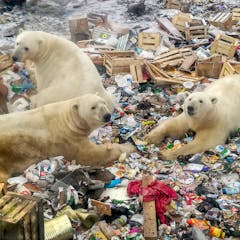
Articles on Sea ice
Displaying 1 - 20 of 84 articles

Four years of persistent ozone holes have sparked concern about what more UV is doing to Antarctic ecosystems.

In 1898, a pioneering Antarctic expedition was stuck in sea ice for over a year. In 2024, that area is open water.

A UN meeting this week considered a motion on a suite of technologies known as ‘solar radiation modification’, but no consensus could be reached on the controversial topic.

Last year was the hottest in recorded history. That heat led to a range of unusually intense weather events across Australia.

The early heat melted snow and warmed rivers, heating up the land and downstream ocean areas. The effects harmed salmon fisheries, melted sea ice and fueled widespread fires.

Sea ice around Antarctica has always followed a predictable seasonal cycle. Now, we’ve experienced a sudden dramatic loss, and the changes are here to stay.

Climate change and the nuclear threat are raising concerns about our planet’s future ability to support human life. If we launch a species survival mission, who should go?

Sea ice extent in July 2023 has been around 10% below last year’s record low for the month.

More trouble in Antarctica: the extent of frozen seawater fastened to the coast (called landfast ice) hit a record low in March 2022. If this trend persists, the consequences could be catastrophic.

Drought in Europe, dwindling Arctic sea ice, a slow start to the Indian monsoon – unusually hot ocean temperatures can disrupt climate patterns around the world, as an ocean scientist explains.

We are on a trajectory that takes Earth across thresholds humans have never experienced, into a climate where Antarctica’s ice shelves can no longer exist, leading to several metres of sea-level rise.

Freshening seawater around Antarctica is disrupting a global ocean conveyor which regulates the climate.

A short history of predicting an ice-free Arctic – and why you should listen to this one.

Scientists have detected a 30% slowdown of the deep ocean currents that form in Antarctica, with profound consequences for Earth’s climate, sea level and marine life.

The world’s oceans regulate our climate, but they are entering uncharted territory, with record surface warming and changes to Antarctica’s deep meltwater which drives global currents.

In the years since the Supreme Court rejected Kivalina’s appeal on May 20, 2013, the community’s search and rescue team has faced increasing climate disasters: ‘We just can’t adapt this fast.’

Atmospheric rivers can melt fragile new sea ice. When these storms arrive in waves, the sea ice doesn’t have a chance to recover.

Emperor penguins survive in a ‘Goldilocks zone’ between too much sea ice and too little. Climate change is having an impact.

Polar bears are increasingly seeking sustenance in human trash because of melting sea ice and a loss of hunting opportunities. The result is a rise in human-bear conflict – and dead bears.

The ocean is often considered a silent universe. But many recent studies highlight the importance of the soundscape for many marine species, both large and small.
